Six Solar Terms in Autumn

People usually say that autumn is a cooler season. When autumn approaches, temperatures begin to drop, and the weather is no longer as hot as in summer. Autumn is a season of harvest. After busy spring and summer, all crops bear lots of fruits. A vast field of golden color comes into sight. Autumn begins at Liqiu (Beginning of Autumn) and ends at Shuangjiang (Frost’s Descent).
Liqiu (Beginning of Autumn)
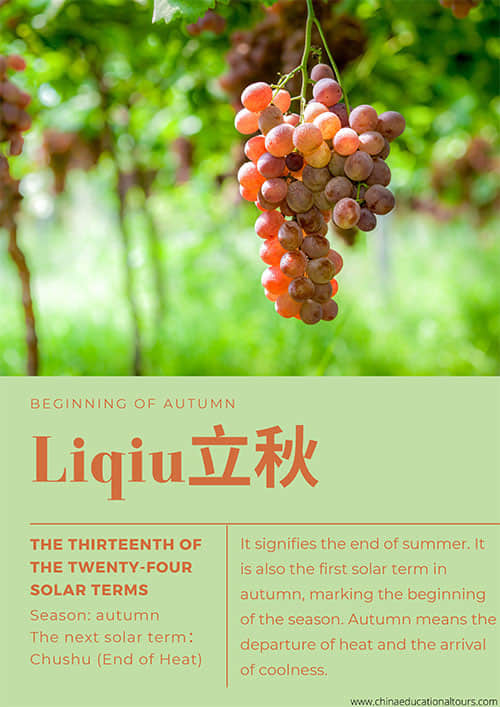 Liqiu 立秋
Liqiu 立秋
Liqiu is the thirteenth of the twenty-four solar terms of the lunar calendar. It signifies the end of summer. It is also the first solar term in autumn, marking the beginning of the season. Autumn means the departure of heat and the arrival of coolness. When Liqiu comes, the leaves of sycamore trees begin to fall. Therefore, there is an idiom in China, Luoyezhiqiu, which means that one will sense the arrival of autumn when they see leaves begin to fall from trees. Literally, the Chinese character qiu (秋, autumn) consists of two parts, he (禾, rice) and huo (火, fire), meaning the ripening of rice. Autumn is a transitional season in which heat is replaced by coolness, and coolness is replaced by coldness.
- Chinese name: 立秋Lì Qiū
- Meaning: the beginning of autumn
- Climate: After the Autumn Tiger (Chinese term for Indian summer, a brief period of heat), the weather gradually cools down.
- Season: autumn
- Date: August 7, 8, or 9
- Traditional food: watermelons, green beans and chili peppers
- Customs: Shaiqiu Festival (Autumn Basking Festival) and Qiumang Fair (Busy Autumn Fair)
- Farming Activities: Farmers prepare for land plowing and flattening, and fertilizing.
- Health tips: You need to have reasonable nutritional intake and a balanced diet.
- The next solar term: Chushu (End of Heat)
Chushu (End of Heat)
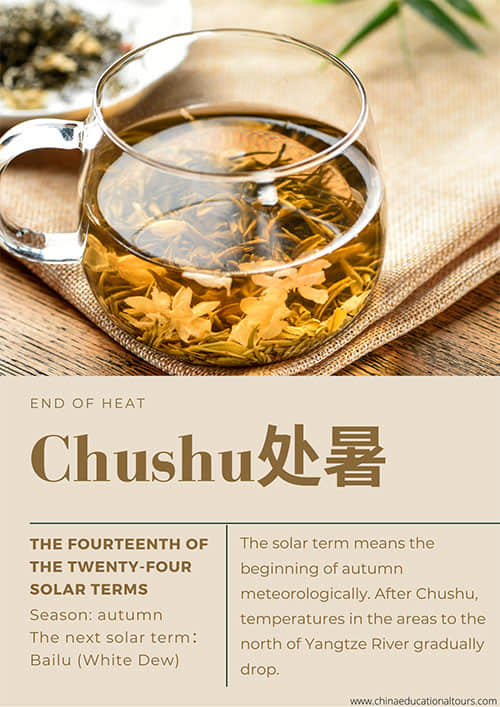 Chushu处暑
Chushu处暑
The term Chushu literally means the Exit of Heat. The solar term means the beginning of autumn meteorologically. After Chushu, temperatures in the areas to the north of Yangtze River gradually drop.
- Chinese name: 处暑Chǔ Shǔ
- Meaning: the end of heat
- Climate: lower temperature, Indian summer, and thunder storms
- Season: autumn
- Date: August 22, 23, or 24
- Traditional food: duck
- Customs: floating river lanterns, fishing festival, water splashing games
- Farming Activities: harvest and sun basking of produce
- Health tips: You need to nurture the yin and suppress dryness in the body.
- The next solar term: Bailu (White Dew)
After Chushu, autumn gradually takes over. The customs before the solar term usually have something to do with ancestral worship and celebrations for autumn’s arrival. Important festivals before and after the solar term are the Double Seventh Day and the Ghost Festival (Zhongyuan Festival).
Bailu (White Dew)
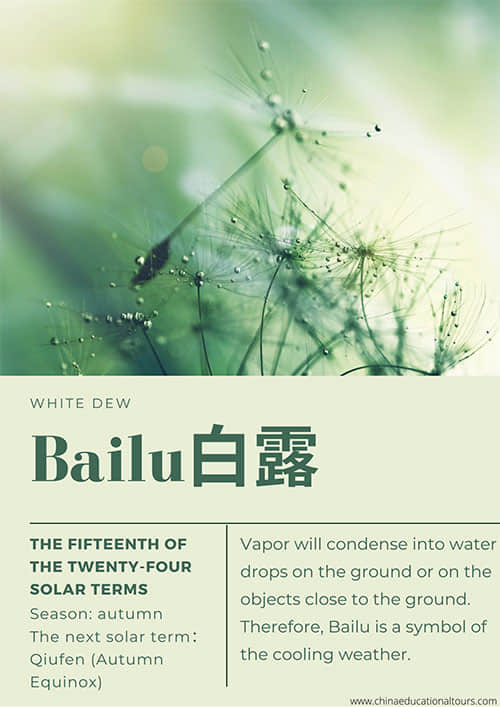 Bailu白露
Bailu白露
Bailu is the fifteenth in the twenty-four solar terms, as well as the third one in autumn. When autumn begins, the temperature begins to drop, and the difference in temperature between day and night becomes greater. Vapor will condense into water drops on the ground or on the objects close to the ground. Therefore, Bailu is a symbol of the cooling weather.
- Chinese name: 白露Bái Lù
- Meaning: White dew marks the beginning of cool weather.
- Climate: Temperature drops rapidly, and drizzles begin.
- Season: autumn
- Date: September 7, 8 or 9
- Traditional food: tea, rice liquor, longan, and sweet potatoes
- Customs: worshipping Yu the Great
- Farming Activities: Irrigation and heat insulation
- Health tip: You need to keep warm and prevent allergies.
- The next solar term: Qiufen (Autumn Equinox)
Qiufen (Autumn Equinox)
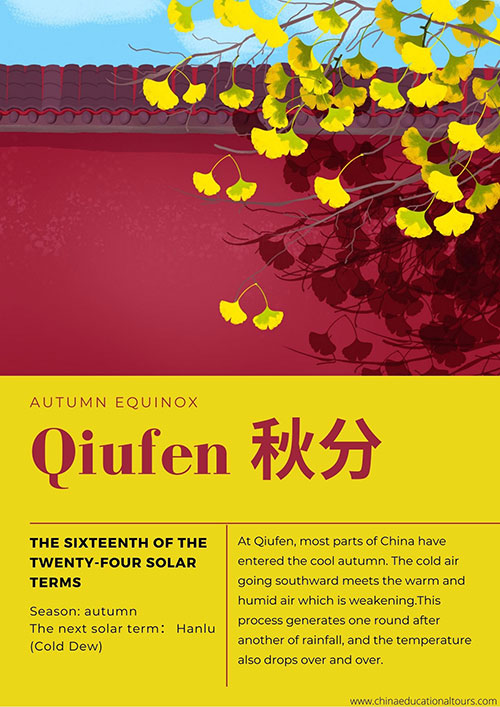 Qiufen 秋分
Qiufen 秋分
At Qiufen, most parts of China have entered the cool autumn. The cold air going southward meets the warm and humid air which is weakening. This process generates one round after another of rainfall, and the temperature also drops over and over. As people usually say, “A round of autumn rain brings a period of coldness”. However, the daily rainfall after Qiufen is not much. At the time, there are differences of farming activities in the south and north.
- Chinese name: 秋分Qiū Fēn
- Meaning: Qiufen signifies the midpoint of autumn. At Qiufen, the day and night are equally divided.
- Climate: temperature difference between day and night becomes even greater, the temperature drops day by day.
- Season: autumn
- Date: September 22, 23 or 24
- Traditional food: autumn vegetables
- Customs: sacrificial offerings to The Moon
- Farming Activities: autumn harvest, plowing and sowing
- Health tips: Keep your mood positive. Adjust your sleeping habits. Sleep early and get up early.
Hanlu (Cold Dew)
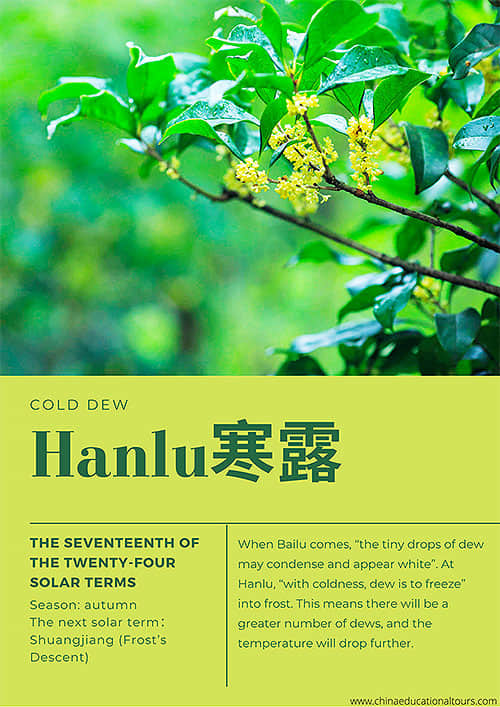 Hanlu 寒露
Hanlu 寒露
Hanlu is the seventeenth in the twenty-four solar terms, as well as the fifth one in autumn. In ancient times, people considered dews as a sign of transition from coolness into coldness. When Bailu comes, “the tiny drops of dew may condense and appear white”. At Hanlu, “with coldness, dew is to freeze” into frost. This means there will be a greater number of dews, and the temperature will drop further. At this time, late autumn sights prevail in Northern China, where white clouds float above forests with red leaves, and early frost appears occasionally. In Southern China, there are also more autumn sights.
- Chinese name: 寒露Hán Lù
- Meaning: even lower temperature
- Climatic characteristics: lower temperature and colder dew
- Season: autumn
- Date: October 7, 8 or 9
- Traditional food: chrysanthemum liquor
- Customs: chrysanthemum appreciation and mountain climbing
- Farming Activities: frequent irrigation with shallow water flows
- Health tip: You need nurture yin and the lungs. Have less spicy, pungent, or smoked food.
- The next solar term: Shuangjiang (Frost’s Descent)
At Hanlu, it is already late autumn. At this solar term, it is getting colder, and the main custom is mountain climbing. The Double Ninth Festival (Chongyangjie) coincides with this period. The Double Ninth Festival is an important traditional festival in China. Along with Chinese New Year’s Eve, Qingming Festival, and Ghost Festival (Zhongyuan Festival), it is known as one of the four major festivals for ancestral worship.
Shuangjiang (Frost's Descent)
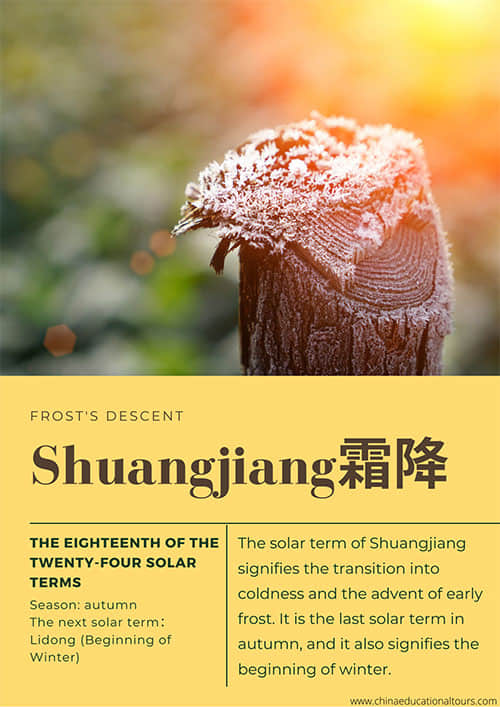 Shuangjiang霜降
Shuangjiang霜降
The solar term of Shuangjiang signifies the transition into coldness and the advent of early frost. It is the last solar term in autumn, and it also signifies the beginning of winter.
- Chinese name: 霜降Shuāng Jiàng
- Meaning: The weather gradually becomes cold, and frost begins to appear.
- Climate: Weather gets colder, and dew condenses into frost.
- Season: autumn
- Date: October 22, 23, or 24
- Traditional food: persimmons
- Customs: chrysanthemum fair
- Farming Activities: harvest, plowing farm lands, sowing of spring crops
- Health tips: avoid autumn dryness, stasis, and coldness.
- The next solar term: Lidong (Beginning of Winter)
Autumn is a season with diverse colors. You may see the clear and blue sky, white clouds, and red leaves all over the mountains. The season is also ideal for traveling. In autumn, there is neither the scorching sunshine of summer, nor the freezing coldness of winter. You may go for a journey anytime you like.
Further Reading
- The 24 Solar Terms
- Recommended Dishes for the 24 Solar Terms
- Six Solar Terms in Spring
- Six Solar Terms in Summer
- Six Solar Terms in Winter

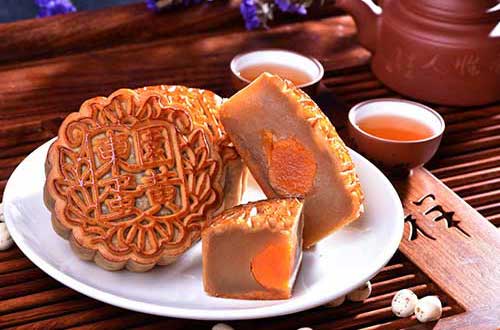 Mid-Autumn Festival
Mid-Autumn Festival 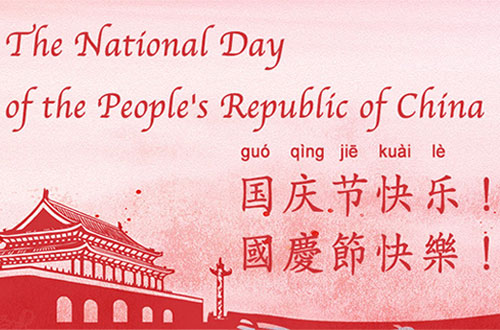 China's National Day
China's National Day 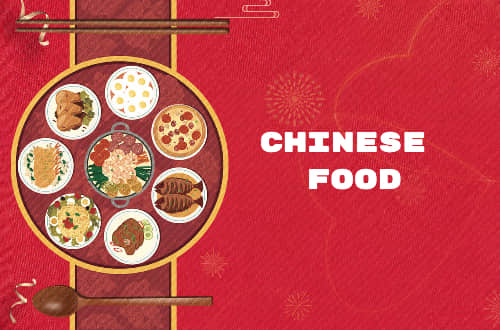 Chinese Food and Related Customs
Chinese Food and Related Customs 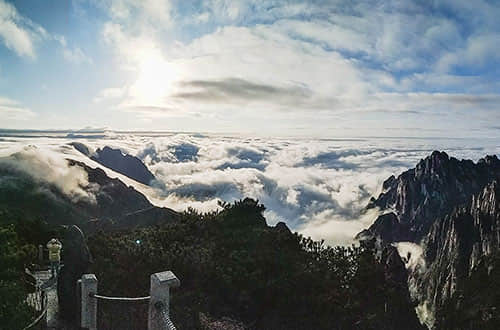 Which is the Best Month to Visit China?
Which is the Best Month to Visit China?